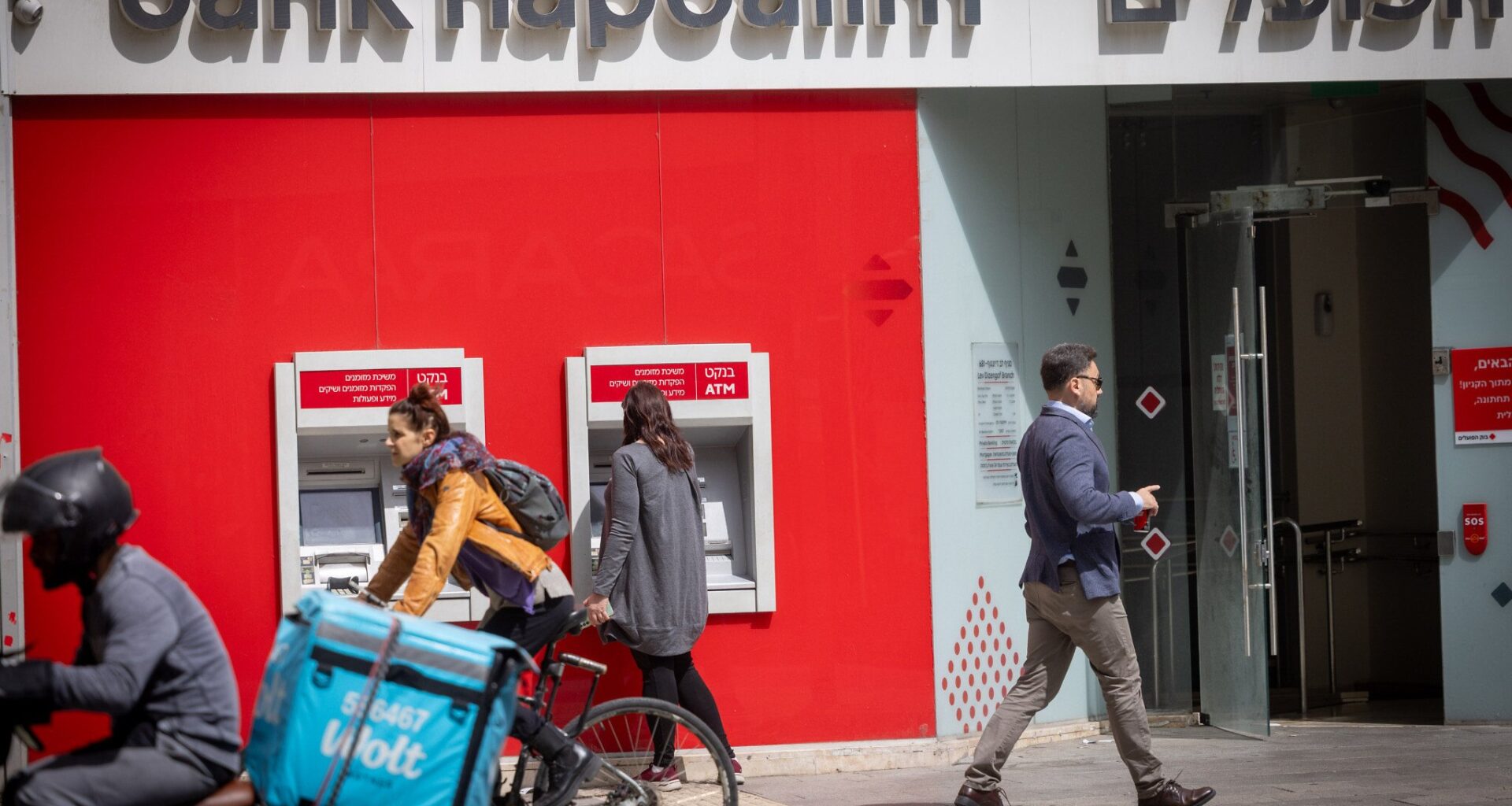The worst of times for many Israeli households and small businesses continues to be the best of times for Israeli banks, who have raked in ever-fattening profits throughout the past 22 months of war.
Earlier this month, the country’s largest banks reported that their already-record profit figures had ballooned by double digit percentages, marking the latest quarter in which they have been able to show off jumbo gains to shareholders.
For many Israelis, the gut-punch isn’t only seeing the rich get richer while they struggle to make ends meet, but the fact that the windfalls are being generated on their backs.
Squeezed by slower demand and more scarce and expensive financing, households and business owners, including military reservists pulled away from work, are borrowing at record numbers, padding bankers’ wallets with high interest payments and fees, financial statements show. All the while, consumers’ own deposits are still generating only meager returns at rates a fraction of what the banks are charging.
The fact that banks are pulling in so much and paying out so little is the “main discrepancy” fueling discontent among the public, according to Michel Strawczynski, a former director of research at the Bank of Israel.
Sign up for the Tech Israel Daily
and never miss Israel’s top tech stories
By signing up, you agree to the terms
“Clearly, such huge profits are not justified when they are generated from the big difference between the credit part and the deposit part,” Strawczynski, a professor of economics at Jerusalem’s Hebrew University, told The Times of Israel. “As a customer, you have to pay a lot when you want credit, and you get much less when you have a deposit.”
Michel Strawczynski, a professor of economics at Jerusalem’s Hebrew University, and a former director of research at the Bank of Israel. (Courtesy)
Born in Uruguay, Strawczynski served as the research department director at the Bank of Israel between 2017 and 2022 and was a member of the central bank’s monetary policy committee. During his tenure, he co-chaired a committee aimed at increasing competition in the credit sector, which included officials from the Finance Ministry.
Officials believe that increasing competition would help shrink the gap, forcing banks to offer better rates and lower fees to attract business. But such schemes take time and have been met thus far with only limited success, according to Strawczynski, who proposed that policymakers could take immediate action to redistribute the banks’ skyrocketing income by slapping a tax surcharge on their excess profits, recouping extra revenue for the state’s coffers, as many European countries have already done.
“Putting some additional tax on banks’ high profits is a logical and doable move,” said Strawczynski. He noted that income is already subject to a progressive tax, which levies higher percentages on those earning more.
“We should also have a progressive corporate tax rate applied to banks, meaning that when they hit a certain profit level, they will pay a higher tax on the additional profits,” he suggested. “It’s a simple measure to profit from the good situation of the banks for the utility of the public, as the collected additional tax revenue will finance public goods and expenditure.”
A picture shows closed shops in the southern city of Sderot near the Gaza border on January 8, 2024, amid continuing battles between Israel and the Hamas. (Alberto PIZZOLI/AFP)
Strawczynski suggested a 30% tax rate on excess profits, which would be higher than the current corporate level in Israel of 23% without going overboard.
Similar steps were already being taken in Spain, Hungary, the Czech Republic and Germany, Strawczynski said.
“While the Bank of Israel has been asking lenders to give money back to the public, a profit tax is preferable, as the government will decide how to best allocate the extra revenue for public expenditure, needs, and services rather than letting banks take the call,” Strawczynski said.
In a nod to public distaste for the record profits, Bank Hapoalim announced on Sunday that it would give its customers two shares of the bank’s stock, worth about NIS 124 ($36), or a grant of NIS 100 ($29), though it admitted the payback was only a token amount.
On August 15, Hapoalim reported profit of NIS 2.5 billion ($740 million) for the second quarter of 2025, up 14% over the same period last year. The bank said its financial results were driven by a 15.1% increase in financing income and an 8.2% surge in fees, alongside strong credit growth.
Over the first six months of the year, Hapoalim and Bank Leumi, the country’s two largest lenders, have raked in a record profit of a cumulative NIS 10 billion ($2.93 billion), up from NIS 9.2 billion during the same period in 2024, besting records set in 2022 and then in 2023, as borrowing costs for mortgage and loan holders remained high and helped propel income from net interest and credit fees.
People shop at the Osher Ad Supermarket in Jerusalem on April 3, 2025. (Yonatan Sindel/Flash90)
From mid-2022 to 2023, the Bank of Israel increased the interest rate from a low of 0.10% to 4.75%, which allowed banks to hike rates for borrowers and rapidly increase the costs of mortgage holders. Since the outbreak of war on October 7, 2023, the central bank cut borrowing costs only once, to 4.5% in January 2024, keeping borrowing rates high for households and businesses.
According to data from Fresh Start, an Israeli nonprofit organization that assists highly indebted households and businesses, as of April 2024, more than one-third of Israeli households were spending thousands of shekels more than their monthly incomes allowed and could not make ends meet without borrowing. Those pressure have only increased as the war has continued, with both taxes and prices on many goods being hiked.
Reservist call-ups and wartime closures have harmed all manner of small businesses, from carpenters to photographers, forcing many to shutter temporarily or causing them to collapse for good.
It is estimated that the number of business closures due to the October 7 onslaught will grow to 80,000 this year from the approximately 60,000 that were wiped out in 2024.
Illustrative: Israelis walk next to Bank Leumi in Jerusalem on November 16, 2014. (Yonatan Sindel/Flash90)
Borrowers essentially have five banks to choose from when taking out loans, with the market dominated by Bank Leumi, Bank Hapoalim, Mizrahi Tefahot, Israel Discount Bank and First International Bank of Israel, who together hold some 98% of the market. Breaking their oligopoly has long been seen as key to keeping banks from running roughshod over consumers.
Earlier this month, Finance Minister Bezalel Smotrich hailed recommendations by an inter-ministerial committee to reduce concentration and increase competition in the retail banking sector as a “pivotal moment” in the fight against the high cost of living.
“For years, the banking system was too centralized, insufficiently competitive, and didn’t offer fair enough terms,” said Smotrich. “This is a necessary, bold move that will break the monopoly, bring interest rates down, and give power back to the public.”
The proposed framework outlines a graduated approach to lower the financial and regulatory barriers for new players, including small banks, to obtain a banking license and enter the market.
Strawczynski was unimpressed.
“In many words, they say we wish to have a breakthrough, but when you look at the recommendations, I do not see a game changer coming,” he said. “The idea of having more small banks and foreign lenders enter the market is not new, and it is doubtful it will succeed.”
Finance Minister Bezalel Smotrich, right, and Bank of Israel Governor Amir Yaron attend a press conference in Jerusalem on August 6, 2025. (Yonatan Sindel/Flash90)
He expressed frustration with previous attempts by policy makers to add competition, which he said had seen only limited success to due the entrenchment of the big five.
“The easy card that is used in other countries to let foreign banks enter the market by improving conditions is not one we can use,” Strawczynski explained. “We tried in recent years, but we never succeeded, not due to the security situation, but because the local market is so concentrated that foreign banks do not want to come to Israel to spend many years trying to conquer a tiny market share.”
Keeping it competitive
Strawczynski acknowledged that his tax plan could backfire if banks passed the costs on to consumers by raising fees. Part of his idea would require tighter monitoring by regulators to monitor credit and deposit interest and fees charged to customers.
At the same time, he hasn’t given up on increasing competition as a tool to keep banks from pigging out.
He praised earlier steps by the Bank of Israel that allowed online banks to enter the local market. In 2019, One Zero Digital Bank Ltd., set up by tech entrepreneur Amnon Shashua, was the first to be awarded a banking license in Israel in over 43 years.
Three years later, the central bank granted a conditional license for the establishment of the country’s second digital bank, Esh Bank Israel, co-led by Nir Zuk, the American-Israeli founder of the cybersecurity firm, Palo Alto Networks, Inc. Both hope to compete with the nation’s five largest lenders by offering more attractive conditions and services for consumers.
“If you go to a bank today and you ask for a deposit for one year, you will get interest of about 3.7% and at One Zero, you will be offered 4.5% which is a huge difference, and a clear mark of competition in the deposit sector because they need depositors’ money and new customers,” said Strawczynski. “That’s the difference to the traditional banks, which are benefiting from both capital and a lot of liquidity.”
Stores on Tel Aviv’s usually bustling Dizengoff Street stand closed amid tensions with Iran, June 13, 2025. (Noam Lehmann/The Times of Israel)
Strawczynski argued that the government, led by the Finance Ministry, should push reforms that allow non-banking outfits to enter the lending market, with the goal of getting vital lines of credit to small and medium-sized business owners at more competitive rates.
“Small and medium-sized businesses are completely dependent on the traditional banks for their financial activity, and they are also the first to shut down during a challenging war period,” said Strawczynski.
He noted the importance of many of these smaller businesses to ensuring Israelis continued to receive paychecks.
“Small firms have low profits but provide more employment,” he added. “That’s why policymakers should be interested in advancing competition and improving their situation.”







